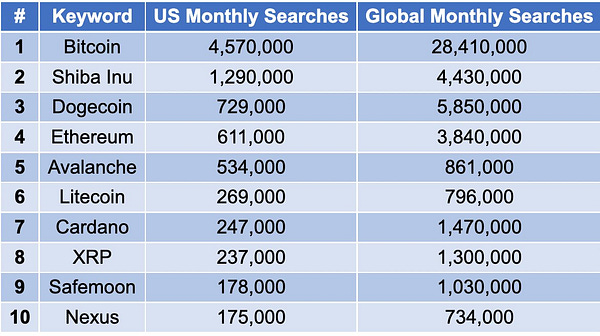Riding The Wave News Summary 106
Binance Failing to Get US Exchange Listings for BNB Is Yellow Flag for Crypto Analysts, Crypto Adds Unsavory Footnote to Dreadful 2022: Year of the Rug Pull, & more
Welcome to Riding The Wave. If you have questions or feedback, please reply to this email. If you are new to the Newsletter, please check out what we provide on our about page and consider subscribing. Within the Newsletter, I provide News Summaries, Weekly Status Updates, & Deep Dive Articles on Specific Topics (Ex: How do I pick which coins/tokens to buy?). More details here
News
Table of Contents
Tweets
Binance Failing to Get US Exchange Listings for BNB Is Yellow Flag for Crypto Analysts
Crypto Adds Unsavory Footnote to Dreadful 2022: Year of the Rug Pull
Blockware sued over alleged misrepresentation of miners’ performance
Tweets









Binance Failing to Get US Exchange Listings for BNB Is Yellow Flag for Crypto Analysts
Binance, the world’s biggest crypto exchange by trading volume, has been the focus of crypto-market speculation in recent weeks after blockchain watchers detected billions of dollars of deposit outflows, the company’s auditor begged off and reports emerged the company might be under investigation by U.S. authorities.
Such anxieties are clearly reflected in the recent downward trajectory for Binance’s in-house token, BNB: The price has tumbled about 17% this month to $245, vastly underperforming the broad CoinDesk Market Index of digital assets, which is down 5.7%.
So as crypto analysts home in on BNB token’s valuation, they’re scrutinizing the FTT token’s arc for any red – or yellow – flags that, in hindsight, might have tipped investors off to the market’s fragility. And a key similarity stands out: Just as FTX’s FTT token had mostly failed to get listed on major U.S. crypto exchanges, so is BNB absent from a large number of U.S. exchanges. (It is listed on Binance.US.)
“Exchanges probably do not list BNB as they see it as a security given the centralization of their network,” said Lucas Outumuro, head of research at IntoTheBlock, in an interview with CoinDesk. “It's probably not worth U.S. exchanges risking listing a security especially if it's a competitor's token.”
The risk was underscored this week when the U.S. Securities and Exchange Commission labeled FTX’s FTT token as a security in a complaint.
The U.S. exchange Kraken lists over 120 tokens but does not offer BNB to its customers.
A Kraken spokesperson said to CoinDesk that “Kraken is an agnostic player in the crypto market” and that it “has a robust asset selection and listing procedure that ensures assets receive the analysis and vetting they deserve, which includes a rigorous compliance, legal and security process.”
While this could be a red or yellow flag, it’s more likely that Binance’s token isn’t listed on other exchanges because they are competing. It’s normal not to want to host your competitor’s product on your exchange. The concern about securities is likely also a valid concern, but it’s valid for the majority of cryptocurrencies and not just the BNB token.
Crypto Adds Unsavory Footnote to Dreadful 2022: Year of the Rug Pull
The year 2022 is likely to go down as one of the worst ever in the blockchain industry’s volatile history.
But for scammers trolling digital-asset markets for suckers or even easy pickings from savvy crypto traders, it’s been a banner year.
A new report from blockchain risk monitoring firm Solidus Labs shows that fraudsters deployed over 117,000 scam tokens from Jan. 1 to Dec. 1, 2022, a 41% increase over the full 2021.
“These fraudsters – benefiting from the fact that more than 99% of their malicious tokens have evaded detection under traditional approaches to scam identification – deposited and withdrew a combined $11 billion worth of ETH to/from 153 different centralized finance [CeFi] exchanges during the time period we studied,” the report read.
But why have the majority of rug pulls gone undetected in the past, and why aren’t these tokens counted on crypto pricing sites that mostly put the number of digital assets in existence at around 20,000?
Solidus Labs Chief Operating Officer Chen Arad pointed out that not all tokens deployed on blockchains are listed on pricing data sites because they’re not verified.
Arad told CoinDesk in an emailed comment that the report’s data is based on “continuously scanning smart contracts as they’re deployed on blockchains and flagging the token smart contracts that are hard-coded to scam users.”
Another type is called “soft rug pull,” or an exit scam where the scammer promotes their token to steal from investors by publishing misleading marketing websites and road maps, announcing fake partnerships, or using bots to manufacture trading activity, according to the report.
The study identified a “hard rug pull” as a token scam where the scammer programs their token to steal from investors.
Blockware sued over alleged misrepresentation of miners’ performance
Keep reading with a 7-day free trial
Subscribe to Riding The Wave to keep reading this post and get 7 days of free access to the full post archives.












